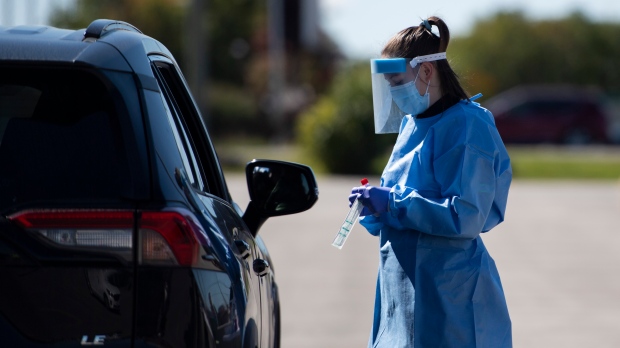TORONTO —
New COVID-19 infections in Ontario have dropped to the 600s after the province recorded its highest single-day case count since the beginning of the pandemic on Friday.
Health officials reported 653 new cases of the disease on Saturday morning, down from the 732 infections logged a day earlier.
The province also added four more COVID-19-related deaths in the last 24-hour period and 435 cases it now considers to be resolved.
As well, 37 more deaths were added due to what the province calls data remediation.
The province said the 37 COVID-19-related deaths, and a “number of” other cases, were added based on a “data review” at Toronto Public Health.
“Deaths of cases that occurred in the spring or summer are now being recorded as part of a data review and data cleaning initiative,” the Ministry of Health said.
Saturday’s report brings the province’s COVID-19 case total to 53,633—including 2,968 deaths and 45,285 recoveries—a 1.2 per cent increase over Friday’s total.
Right now, there are 5,380 active cases of COVID-19 in Ontario.
On Friday, the province asked residents to now only come in close contact with those inside their immediate household, effectively putting a pause on social circles.
Premier Doug Ford also laid out a number of new restrictions to curb the spread of the disease in the province’s three COVID-19 hotspots —Toronto, Ottawa and Peel Region—as Ontario logged two days of record-breaking daily case counts this week.
Despite the decrease, the new infections recorded on Saturday represent case numbers unseen since late April, when the province was regularly documenting daily case counts in the 500s and 600s.
At that time, the province had just unveiled its three phase plan to restart the economy while much of Ontario remained in a state of lockdown.
Nearly half (322) of the new cases reported Saturday are in people between the ages of 20 and 39. That age group accounts for most of Ontario’s lab-confirmed COVID-19 cases at 18,769.
157 cases were recorded in people between the ages of 40 and 59, while 99 new infections were reported in people 19 years of age and younger.
Forty-nine new cases are in people between the ages of 60 and 79 and 24 new cases were documented in people 80 years of age and older.
Where are the new COVID-19 cases?
Most of the new cases of COVID-19 in Ontario continue to be reported by just three regions.
There are 284 new cases in Toronto, 104 in Peel Region and 97 in Ottawa.
At least five other public health units are also reporting new case numbers in the double digits, including York Region, Hamilton and Waterloo.
Meanwhile, a number of the province’s other 34 public health units are reporting fewer than five new cases of the disease. Several regions are reporting no new cases at all.
The number of hospitalizations for COVID-19 in Ontario now stands at 155, down from the 167 patients reported a day earlier.
Of those 155 patients, 41 are being treated in an intensive care unit, 23 of which are breathing with the assistance of a ventilator.
Earlier this week, the province released new modelling data on the novel coronavirus which stated that Ontario hospitals can “maintain non-COVID capacity and all scheduled surgeries” when there are less than 150 people in an ICU with the disease.
ICU admissions for COVID-19 in Ontario hospitals beyond 150 patients will make it more difficult to treat non-COVID patients, according to the data. If ICU admissions for the disease surpass 350, the province said it would be “impossible” to support non-COVID-19 patients.
Since the beginning of the pandemic, 1,100 Ontarians have been admitted to an ICU for treatment of their COVID-19 symptoms.
Update on COVID-19 testing in Ontario
Testing for COVID-19 in Ontario remains high with 46,254 tests completed since yesterday.
Since the beginning of the pandemic, the province has processed more than four million tests for the disease.
There are 91,322 tests currently under investigation, setting a new record for the province’s testing backlog for the second day in row.

Devoted web advocate. Bacon scholar. Internet lover. Passionate twitteraholic. Unable to type with boxing gloves on. Lifelong beer fanatic.





